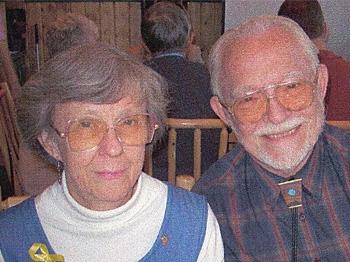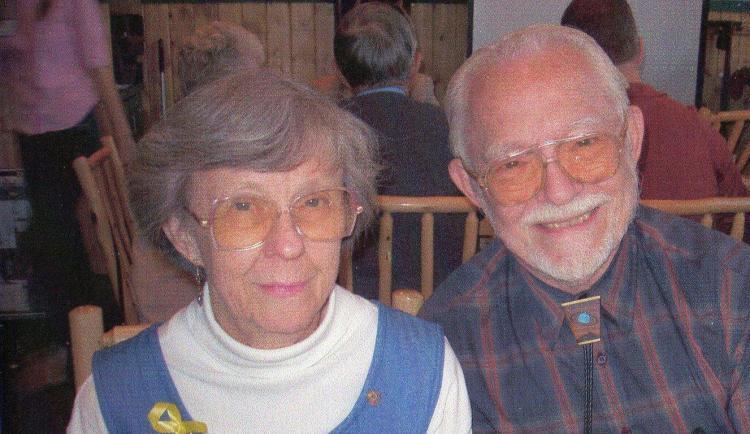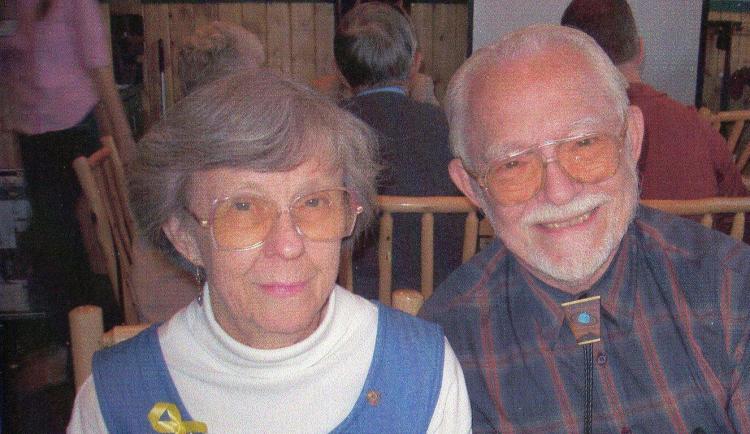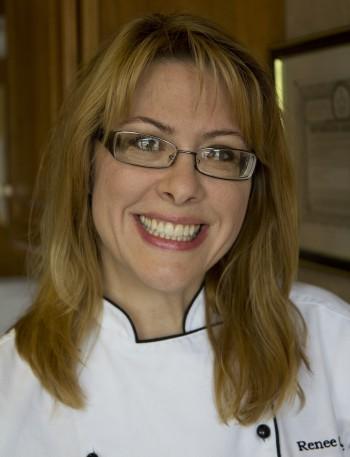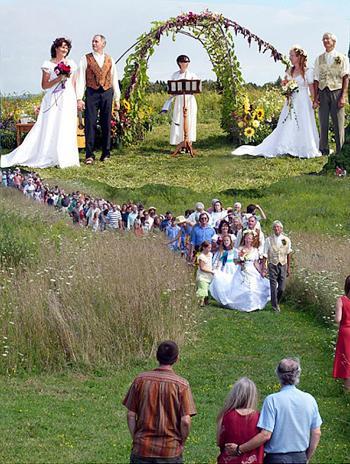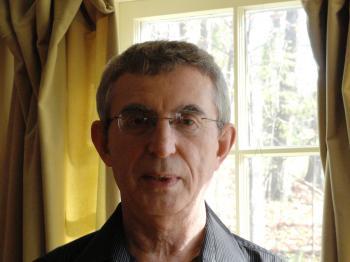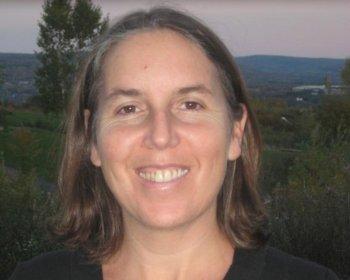Donald and Cynthia Anderson are two of the most remarkable persons I have interviewed. If more people were like them, the world would be a better place for us.
It is always inspiring to hear of a marriage that works for the good of the world, and for themselves, especially this holiday season when the world seems to be in disarray.
Their strengths are complementary and they have done good working shoulder to shoulder. Members of the United Methodist Church, they work with a group that helps people who are flooded or struck by tornadoes.
Twice in Katrina’s aftermath, they went to help clean up debris and to listen to the individual stories of those affected.
Don, who has had a brilliant career as an engineer, was a professor at the University of Minnesota and was with Sheldahl, a Minnesota company that worked on the Apollo program.
Born in Delavan, a Minnesota farming community of 300 persons, Don says, “Eight miles south and I could have claimed to be an Iowan rather than a Minnesotan.
“My first seven grades were spent swimming in the lake, skiing, sledding, and attending a one-room school with 20 children.
{etRelated46197, 44721}“I had chores: going to the spring, pumping water by hand (there was no electricity); carrying fuel for the wood stove; removing the ash; milking cows.
“On our farms, we did not believe in monoculture: we had a dozen cows, dozens of pigs and chickens; field crops (corn, soybeans, alfalfa); and a large garden—by my mother’s reckoning she harvested 300 quarts of tomatoes.
“In 1948, we moved to Wells (pop. 3,000), where I was valedictorian of the graduating class of 1948. A tuba player in the school orchestra, I heard that musicians starve, so I switched to engineering; it was the right choice.”
Don met his wife Cindy 58 years ago when she was a student at the Swedish Hospital School of Nursing in Minneapolis.
“I went out on a blind date,” he says, “but as luck should have it, I needed to change a flat tire. Other blind dates would have sulked in the car. But, Cindy, my blind date, got out of the car in the drizzle and held a flashlight and umbrella for me.
“That did it for me; we dated, and soon after decided to get married two months before her graduation from nursing school. We have had a very interesting life together these 56 years. We have complementary qualities. Cindy remembers people; their names and stories. I remember places and how to get there.”
Don is a brilliant inventor with 35 disclosures, 15 patents, including ones in alternative energy—wind turbines, energy management with windows that become walls.
Cindy remembers persons and their life stories. Her own life story is an inspiration to all who know her. She was born in Young America (40 miles from the Twin Cities, MN)—the town’s name is what one would say about Cindy’s heart-thinking.
Here is Cindy’s story in her own words that the interviewer has gleaned for this article:
“The suburban spread has overtaken Young America. I was born on rolling countryside with many dairy farms.
“Mother had a vegetable, and flower garden (tulips, lilies, roses, irises); we lived in the same house till I graduated and went to nursing school in 1951—my training as a nurse has stood me in great stead for raising my four children and grandchildren, and for my work as a volunteer in the United Methodist Church, arranging funeral lunches at the Methodist Church, and as a volunteer where floods and hurricanes come to areas; helping, and listening to the tragic stories of the survivors.
“My grandparents emigrated from a small village on the Rhine River in 1882; I visited the village—the houses were built close together, each took care of its own garden—no weeds anywhere—the houses had tile roofs, and were brick and stucco; I met a family who remembered where my grandparents lived.
“Don’s family came from Scotland—the Anderson clan—we took with us 11 members of our immediate family to lodgings there.
Don bought a kilt; we were served Scottish meals of meat, potatoes, and vegetables, and we ate the national dish of Haggis, cooked in the innards of the stomach of a sheep mixed with oatmeal and served with neeps (turnips) and tatties(potatoes).”
Cindy’s heart-warming stories about her experiences make me think that she and her husband Don make an extraordinary team in our world looking for heroes in 2010.
It is always inspiring to hear of a marriage that works for the good of the world, and for themselves, especially this holiday season when the world seems to be in disarray.
Their strengths are complementary and they have done good working shoulder to shoulder. Members of the United Methodist Church, they work with a group that helps people who are flooded or struck by tornadoes.
Twice in Katrina’s aftermath, they went to help clean up debris and to listen to the individual stories of those affected.
Don, who has had a brilliant career as an engineer, was a professor at the University of Minnesota and was with Sheldahl, a Minnesota company that worked on the Apollo program.
Born in Delavan, a Minnesota farming community of 300 persons, Don says, “Eight miles south and I could have claimed to be an Iowan rather than a Minnesotan.
“My first seven grades were spent swimming in the lake, skiing, sledding, and attending a one-room school with 20 children.
{etRelated46197, 44721}“I had chores: going to the spring, pumping water by hand (there was no electricity); carrying fuel for the wood stove; removing the ash; milking cows.
“On our farms, we did not believe in monoculture: we had a dozen cows, dozens of pigs and chickens; field crops (corn, soybeans, alfalfa); and a large garden—by my mother’s reckoning she harvested 300 quarts of tomatoes.
“In 1948, we moved to Wells (pop. 3,000), where I was valedictorian of the graduating class of 1948. A tuba player in the school orchestra, I heard that musicians starve, so I switched to engineering; it was the right choice.”
Don met his wife Cindy 58 years ago when she was a student at the Swedish Hospital School of Nursing in Minneapolis.
“I went out on a blind date,” he says, “but as luck should have it, I needed to change a flat tire. Other blind dates would have sulked in the car. But, Cindy, my blind date, got out of the car in the drizzle and held a flashlight and umbrella for me.
“That did it for me; we dated, and soon after decided to get married two months before her graduation from nursing school. We have had a very interesting life together these 56 years. We have complementary qualities. Cindy remembers people; their names and stories. I remember places and how to get there.”
Don is a brilliant inventor with 35 disclosures, 15 patents, including ones in alternative energy—wind turbines, energy management with windows that become walls.
Cindy remembers persons and their life stories. Her own life story is an inspiration to all who know her. She was born in Young America (40 miles from the Twin Cities, MN)—the town’s name is what one would say about Cindy’s heart-thinking.
Here is Cindy’s story in her own words that the interviewer has gleaned for this article:
“The suburban spread has overtaken Young America. I was born on rolling countryside with many dairy farms.
“Mother had a vegetable, and flower garden (tulips, lilies, roses, irises); we lived in the same house till I graduated and went to nursing school in 1951—my training as a nurse has stood me in great stead for raising my four children and grandchildren, and for my work as a volunteer in the United Methodist Church, arranging funeral lunches at the Methodist Church, and as a volunteer where floods and hurricanes come to areas; helping, and listening to the tragic stories of the survivors.
“My grandparents emigrated from a small village on the Rhine River in 1882; I visited the village—the houses were built close together, each took care of its own garden—no weeds anywhere—the houses had tile roofs, and were brick and stucco; I met a family who remembered where my grandparents lived.
“Don’s family came from Scotland—the Anderson clan—we took with us 11 members of our immediate family to lodgings there.
Don bought a kilt; we were served Scottish meals of meat, potatoes, and vegetables, and we ate the national dish of Haggis, cooked in the innards of the stomach of a sheep mixed with oatmeal and served with neeps (turnips) and tatties(potatoes).”
Cindy’s heart-warming stories about her experiences make me think that she and her husband Don make an extraordinary team in our world looking for heroes in 2010.

